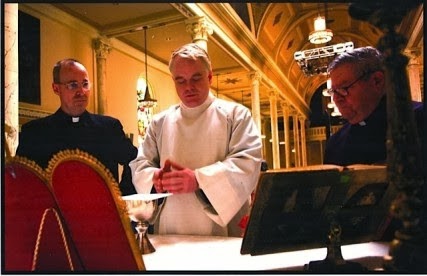Common-Sense Catechesis
A new book,
Common-Sense Catechesis, by the prolific professor, author, and storyteller,
Rev. Robert J. Hater, has a very telling sub-title. It is:
Lessons From the Past, A Road Map Toward the Future
Published last month (during March 2014) by the
Our Sunday Visitor company, this is a volume that ought to be read by every PCL and DRE in every contemporary Catholic parish -- and also by experienced catechists in parishes and schools, principals and administrators, priests, deacons, and those others who have a genuine interest in or need for information about
-- where we have come from in the practice of religious education (recent decades);
-- an honest assessment of "where we are" in catechesis the U.S. Church at this time; and
-- where we are going regarding catechesis and faith-formation for the foreseeable future.
That's a lot for a 256 page book! But given Bob Hater's forthright style and characteristic clarity in expressing his insights and anecdotes,
Common-Sense Catechesis contains a lot of, well, common sense, historical perspective on catechetical practice stretching back into the 20th century, a frank assessment of our morphing catechetical situation today (toward an "incarnational catechesis"), and much valuable information that readers can use.
The author acknowledges salient elements and characteristics of every major catechetical approach that U.S. Catholics have experienced since what he labels the systematic 'memorization phase' of religious education that was prominent during the early 20th century.
Fr. Hater identifies the chronological sequence of approaches as:
• The memorization approach of the early 20th century, with the use of the
Baltimore Catechism
• The chaotic approach of the late 1960s and '70s, plus the effects of Vatican II
• The experiential approach of the 1980s and '90s, including the growth of the RCIA, and
• The systematic approach from the 1990s to today, and the influence of the new
Catechism of the Catholic Church.
The OSV publisher's notes quote a key section -- 'Looking Backward and Forward' -- late in the text:
". . . When considering the challenges (facing) catechesis in the twenty-first century, it is worth remembering that before Vatican II the religious formation of children did not occur only through learning the Baltimore Catechism. Rather, children were formed through the whole Catholic climate. It’s a mistake to conclude that inadequate catechesis of the past thirty-five years is the main reason why many of today’s Catholics do not go to church.
"Catechesis never carried the primary burden for the faith formation of Catholics. Formation occurs primarily in the family, and then in the whole Catholic community. When the Catholic climate was firm and strong, religious formation naturally happened and the Baltimore Catechism easily fit into this picture. Now this climate had changed. In fact, it scarcely exists in some places.
"Catechesis has a formative aspect. Its aim is to convey basic truths of the faith to the catechized. Catechists who act as if they are primarily responsible for children’s religious formation and can make up for the lack of religious formation in the home are greatly disillusioned.
"If a catechist adequately conveys basic Catholic beliefs to the catechized in a prayerful environment, these beliefs are formative in themselves. The degree of formation which occurs, however, often depends upon the support this formation receives in the home.
"Catechesis takes place in the midst of a secular world. For this Catholic formation to be effective, parental cooperation is essential. With their cooperation, catechists can touch the minds and hearts of the catechized.
OSV's publisher notes conclude: Whether you call it common sense or incarnational catechesis, Fr. Bob Hater hits the nail on the head in his new volume
Common-Sense Catechesis.
Blog Post Author: Butch Ekstrom (April 4, 2014)
Share your ideas, comments, and reactions --
BEkstrom@archlou.org
### ###










































